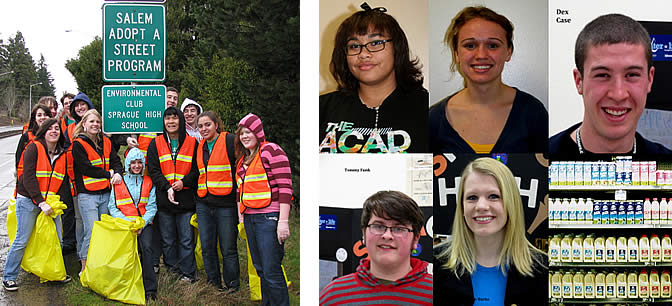
by Izaak Hayes, 18; David Glass, 18; and Viktoria Kreyden, 14
Because of the recession, adults have become less concerned about the environment, according to nationwide polls by Gallup and the Pew Research Center earlier this year. Thankfully, kids across the country are taking up the slack.
Recycling is an easy and popular way of being environmentally friendly, and many high schools organize clubs that recycle paper and promote environmentalism. While most are successful within their schools, getting the community and their families involved can be much more challenging.
One school leading such an effort is Franklin Central High School in Indianapolis, which has 54 members in its recycling club. French teacher Kristy Donley sponsors the club, whose main focus is to recycle paper around the school. Every Thursday, the club meets and members gather all the paper that has been placed in recycling boxes in every classroom. The club has done other environmental activities such as planting bushes and flowers and helping with fund-raisers, but attempts to drum up support in the community has been difficult
On the other hand, the environmental club at Sprague High School in Salem, Ore., has an extensive amount of community support, which has allowed it to flourish. The 30 members, which meet every Tuesday, have an ongoing, multi-faceted recycling program at the school that targets not only paper products but multiple kinds of trash, including cardboard, glass and plastic bottles and now milk cartons. In addition, the club also participates in several service projects, including street cleanups and fundraising for Life Water, a nonprofit that works to bring clean water to Third World countries
The street cleanups are by far the most popular activity. “We always have a blast. We find ridiculous things,” said Dexter Case, 17, who explained that one found object – a stuffed animal – was later cleaned and tie-dyed by club members.
Helping the Sprague club are Oregon’s environmentally friendly laws, such as state-mandated weekly recycling pickup and a bottle bill in which people receive a nickel for each bottle or can returned to a store to be recycled.
Not surprisingly, members of both recycling clubs are strong advocates for the environment and were spurred into action by concerns about the world around them
“I noticed that the environment around me was kind of getting dingy, and I just wanted to get involved and help restore it,” said Megan Burke, 18 of Sprague.
“I hate how much trash we have,” said Shana Cameron, 18, of Franklin Central.
Because of widespread environmental awareness in Oregon, the Sprague students have not confronted many obstacles to their efforts. However, at Franklin Central, though the presence of the white boxes designated as paper recycling bins are abundant, many students just don’t recycle due to laziness or rebellion.
Alexis Phelps, 15, says some Franklin Central students enjoy testing the patience of others by not recycling their paper. “There are troublemakers out there who are just like, ‘Oh it goes in the trash can,’ just because people are gonna get mad,” she said.
Kortney Terry, 18, has noticed similar misbehavior at the school. “I’ve caught people throwing in gum and a couple of paper tissues.”
Some Franklin Central students also have had trouble finding support for recycling in their own homes. Some parents have been unwilling to take the time to sort out papers and plastics.
Shana described how she had to take matters into her own hands at her home: “We drink tons and tons of milk at my house every week, probably seven gallons a week… My parents don’t like [the empty jugs] sitting around the house, so I throw them in the trunk of my car, and when I can fit anything else in my trunk, I drive to Kroger, which is right by my house, and they have the big recycling bins over there.”
Part of the problem may be that unlike families in Oregon, many Franklin Central students don’t have neighborhood recycling pickup. “When I lived in Washington, we had recycling, and if you didn’t recycle all your plastics and bottles and paper, they wouldn’t take your trash,” said Lilly Huntley, 16. “But when we got to Indiana, we saw that there weren’t many recycling programs.”
Though the recycling programs at Oregon schools may be more successful than those in Indiana, people in Oregon aren’t always on board. Tommy Funk, 17, explained that their group has run into opposition: “When we tried to get recycling for the milk cartons and stuff during lunch last year, we found that most students just didn’t care and were throwing them away anyway.”
Although the recycling programs in Oregon and Indiana may operate differently, their goals are the same: to clean up the environment. More and more young people are following suit as they realize the importance of doing it.
Kortney lamented that concern for the environment sometimes peaks early. “The younger you go, the more sympathetic and caring the kids are. Like I remember in elementary school, for Arbor Day we went out and planted trees and we would try and recycle and learn about things. As you get older, students and people in general just get a bit more apathetic,” she said.
Apathy is not acceptable, said Dexter. “Teens, we need to care because we’re going to be the ones who are going to be feeling the effects of bad environmental practices. Global warming, whether you believe in it or not, is going to start affecting our environment and our climate. And we’re going to have to live with the way our earth is,” he said.
Reporter: Moira Corcoran, 12




